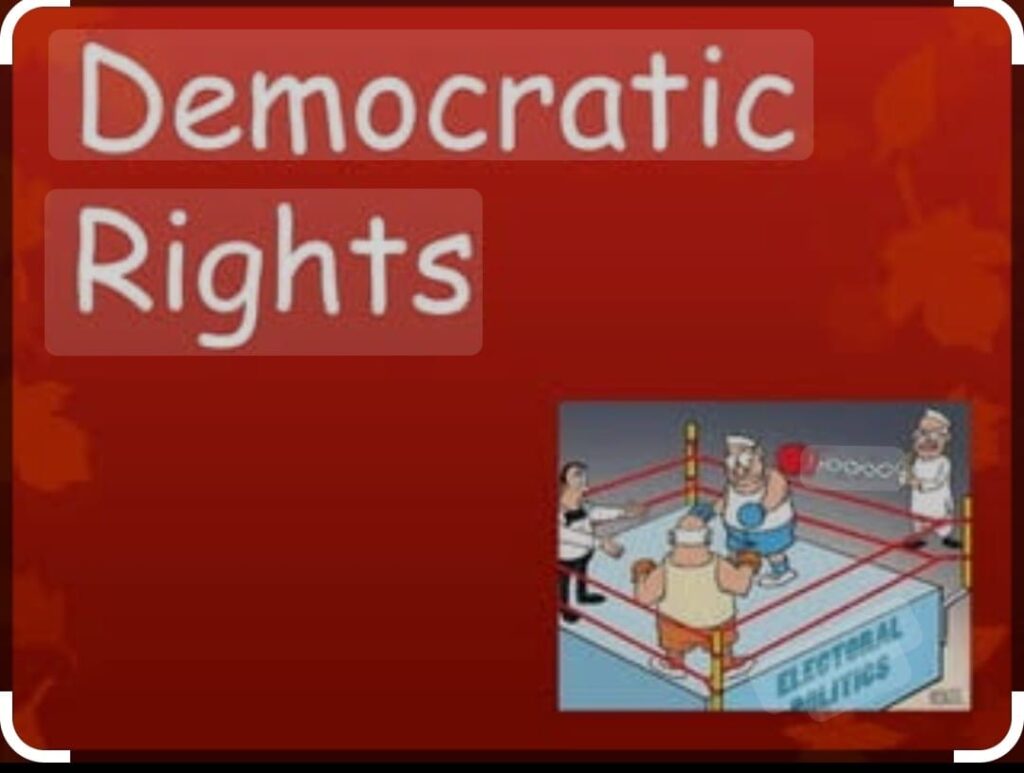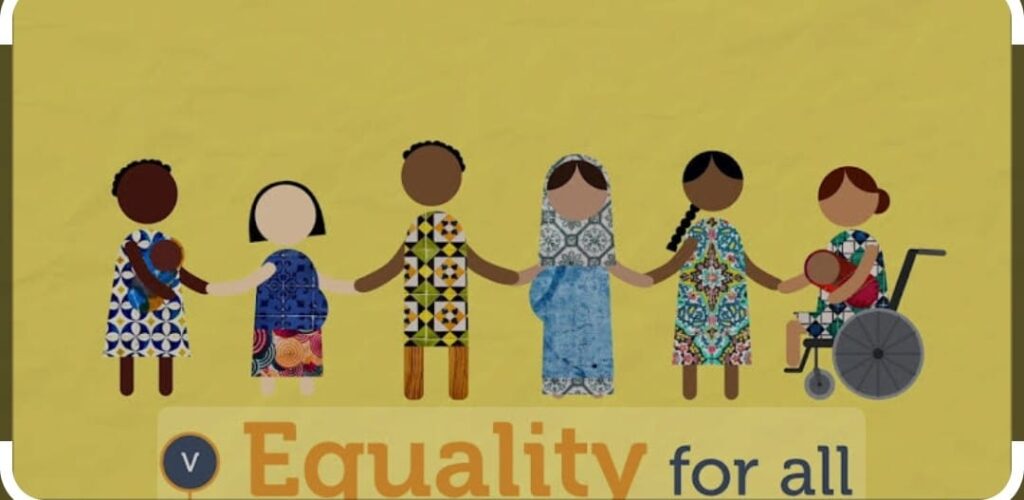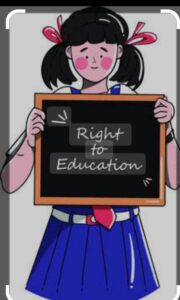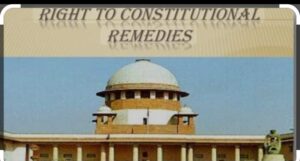Democratic Rights
Democratic Rights is the chapter of Political Science of class 9th gives the detail idea of democratic rights which covers the complete syllabus

Democratic Rights are reasonable claims of persons recognized by the society and sanctioned by law . Rights are necessary for the very sustenance of democracy .
NEEDS OF RIGHTS : Rights protect minorities from the oppression of the majority ,Rights ensure freedom from the repressive laws and the policies , Rights enhances the participation of people in the election process.
RIGHTS IN THE INDIAN CONSTITUTION : There were 6 rights i) Right to Equality ii) Right to Freedom iii) Right to against of Exploitation iv) Right to Freedom of Religion v) Cultural and Educational to Rights vi) Rights to Constitutional Remedies
LIFE WITHOUT RIGHTS In some real cases i) Life of People/ prisoners arrested and kept in the prison of Guantanamo Bay ii) Access of limited of Rights to women in South Arabia iii) The Harsh treatment of Albanians minorities by the Serb Nationalist Milosevic Government.
RIGHTS TO EQUALITY : Article 14 is equality before law means the laws apply in the same manner to all , regardless of the person’s status. This is known as the rule of law .It means that no person is above the law and every person is subjected to same laws .

Article 15 Prohibition of discrimination on the grounds of religion , race , caste ,sex, or place of birth Article 16 equality of opportunity in matter of public employment .Article 17 Abolition of untouchability . Article 18 is the abolition of titles
EQUAL PROTECTION OF LAW means the right to equal treatment in similar circumstances. No one should be favored and no one should be placed under any, disadvantage if the circumstances are similar.
Further the constitution provides that the state shall not discriminate against any citizen on the grounds only of religion, race, caste , sex or place of birth . every Citizen shall have the access to public places like shops , restaurants hotels and cinema halls.
Similarly , there shall be no restriction with regard to the use of wells, tanks , bathing ghats ,roads and playgrounds etc.( Article 15)
ARTICLE 16 IN Which all citizens have equality of opportunity in the matters relating to employment or appointment to any position in the government. Though reservation benefits are provided to some section of society but this is not against right to equality.
Because equality does not mean giving everyone the same treatment, no matter what they need , Equality means giving everyone an equal opportunity to achieve what every one is capable of. Sometimes it is necessary to give special treatment to someone in order to ensure equal opportunity
ARTICLE 17 It is the principle of non discrimination extends to social life as well the practice of untouchability has been abolished and its practice in any form is forbidden
ARTICLE 18 There had been the prohibition of all titles except of military and academic distinctions

RIGHR TO FREEDOM : ( Article 19 – Article 22)
In Article 19 The Constitution of India provides all citizen
a) Freedom of speech and Expression
b) Freedom of assembly in the peaceful manner
c)Freedom of the movement throughout the country
d)Freedom to form associations/ Unions.
e) Freedom to reside in any part of the country
f) Freedom to practice any profession / to carry on any occupation /trade / business.
Article 20 provide safeguard to the accused of crimes and protection in respect of conviction for any offences
ARTICLE 21 in the Constitution says that no person can be deprive of his life / personal liberty except according to procedure established by law. It means that no person can be killed unless the court has ordered a death sentence .
It also means that the government/ police officer cannot arrest or detain any citizen unless he has a proper legal justification
ARTICLE 22 Tells about the rights in case of arrest in which arrested person should be informed of the reasons for such arrest and detention .
The arrested person shall be produced before the nearest magistrate within the period of 24 hrs of the arrest. The arrested person has the right to consult a lawyer/ engage a lawyer for the defense
RIGHT AGAINST EXPLOITATION ( Article 23 – Article 24) In Article 23 tells the prohibition of selling and buying or in human being and forced labour/ beggar and Article 24 tells the prohibition of child labour . No one can us work
RIGHT TO FREEDOM OF RELIGION ( Article25 – Article 28) Article 25 the freedom of conscience and free profession ,practice and propagation of religion Article 26 Freedom to manage religious affairs,
Article 27 Freedom as to payment of taxes for promotion any particular religion Article 28 Freedom as to attendance at religious instruction or religious worship in the certain educational institutions
Every person has right to profess, practice and propagate the religion he or she believe in. Every religious group / sects is free to manage its religious affairs. Every religious group has the right to establish and maintain institutions for religious and charitable purposes , and to own and acquire movable and immovable property
The government cannot compel any person to pay taxes for the promotion/ maintenance of any particular religion/ religious institution . There shall be no religious instruction in the government educational institutions.
In educational institutions managed by private bodies no person shall be compelled to take part in any religious instruction or to attend any religious worships
SECULARISM IN REFERENCE TO ARTICLES : India is a secular state . Secularism is based on the idea that the state is concerned only with relation among human being sand not with the relation between human beings and God .
Citizens have complete freedom to follow any religion. The constitution provides citizens comprehensive rights to profess, practice and propagate the religion he/she believes in . The Secular state is one that does not establish any one religion as official religion.
India has no official religion . Indian secularism practices an attitude of the principled and equal distance from all religions. The state has to be neutral and impartial in dealing with all religions .
CULTURAL AND EDUCATIONAL RIGHTS (Article 29- article30) The constitution provides the cultural and educational rights in article 29 and 30 that any section of citizens with any distinct language/culture have right to conserve it

Admission to any educational institution maintained by the government/ receiving hats government aid cannot be denied to any citizen on the ground of religion / language .
All minorities have the right to establish and administer educational institutions of their choices .
RIGHT TO CONSTITUTIONAL REMEDIES : Article 32 provides a guaranteed remedy for the enforcement of these rights We have a right to seek the enforcement of these rights . This is called right to constitutional remedies. Further this itself is a fundamental rights.

This makes these rights effective. It is possible that sometimes our rights may be violated by fellow, citizens , private bodies or by the government. If it is a Fundamental Right , we can directly approach the Supreme court and the High Courts of the state.
The Supreme court and the high court have the power to issue the directions/orders /writs for the enforcement of the fundamental rights. They can also award compensation to the victims and to the violators
WRITS are the written orders issued by supreme court of India to provide constitutional remedies to protect the fundamental rights of the citizens from a violation Its types a)
HABEAS CORPUS it is writ that is enforced to protect the fundamental right to the liberty of the individual against unlawful detention.
This writ commands public officials to deliver a detained person in front of the court and provide a valid reasons for the detention . However this writ cannot be issued incase the proceeding is for contempt of legislature / court .
b) CERTIORARI It is the writ issued to a lower court directing the transfer of a case for review , usually to overrule the judgement to the lower court. The Supreme Court issues the writ of Certiorari in case the decision passed by the lower court is the challenged by the party . It is issued in case the higher court finds it a matter of over jurisdiction .
c)PROHIBITION is a writ issued by a higher court to a lower court to enforce inactivity in the jurisdiction . It happens only incase the higher court is of the discretion that the case falls outside the jurisdiction of the lower court. Writ of Prohibition can only be issued against judicial and quasi- judicial authorities
d) MANDAMUS is the writ is issued to a subordinate court , an officer of the government / commanding the performance of certain acts /duties. Unlike Habeas Corpus ,Mandamus cannot be issued against a private individual.
e) QUO – WARRANTO is the writ issued against a person who claims /usurps a public office . Through this , the court inquires by what authority the person supports his /her claim . Through this writ the court enquires into the legality of claim of a person to a public office, this writ prevents the illegal assumption of a public office by the individual
Dr . Bhim Rao Ambedkar called the Right to Constitutional remedies ” the heart and soul ” of the Constitution. An independent commission called National Human Rights Commission has been set up by law on 12 October 1993.
It helps the victims secure their human rights especially fundamental rights such as
i) Right to Privacy
ii)Right to a Healthy Environment
iii)Right to adequate Hosing
iv) Right to Work
v) Right to Health
Conclusion : Democratic Rights
This chapter Democratic Rights consist the concise idea about Democratic Rights in Indian Politics which cover the complete idea to be taught in the class 9th.
Follow us on : Facebook
Read More: Electoral Politics